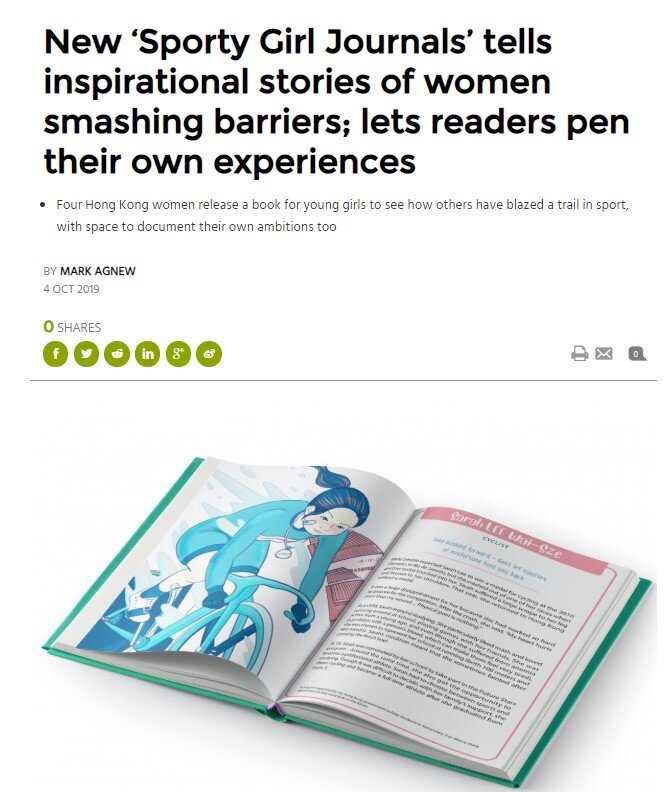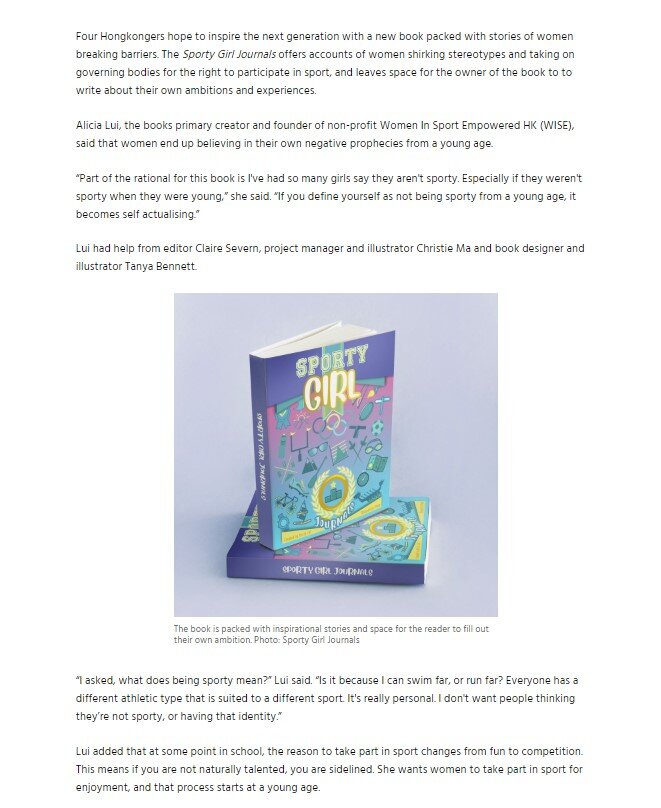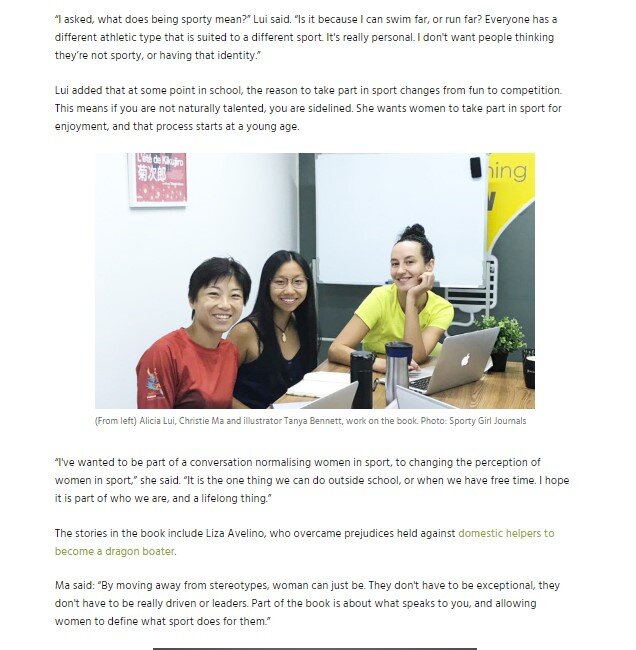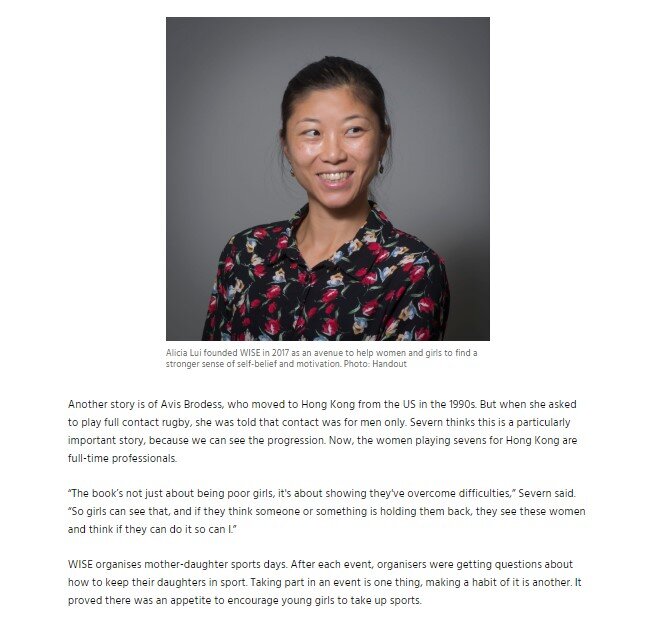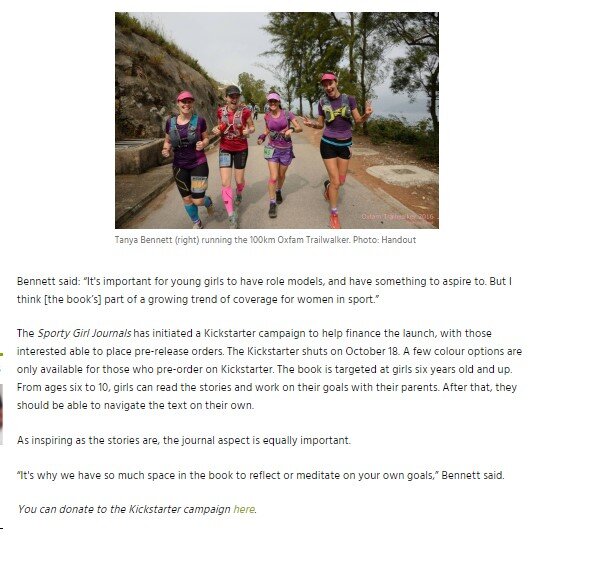Sporty Girl Journals | SCMP
New ‘Sporty Girl Journals’ tells inspirational stories of women smashing barriers; lets readers pen their own experiences
Four Hong Kong women release a book for young girls to see how others have blazed a trail in sport, with space to document their own ambitions too
BY MARK AGNEW
4 OCT 2019
A group of Hongkongers release a book called the Sporty Girl Journals to inspire the next generation of young girls. Photo: Sporty Girl Journals
Four Hongkongers hope to inspire the next generation with a new book packed with stories of women breaking barriers. The Sporty Girl Journals offers accounts of women shirking stereotypes and taking on governing bodies for the right to participate in sport, and leaves space for the owner of the book to to write about their own ambitions and experiences.
Alicia Lui, the books primary creator and founder of non-profit Women In Sport Empowered HK (WISE), said that women end up believing in their own negative prophecies from a young age.
“Part of the rational for this book is I've had so many girls say they aren't sporty. Especially if they weren't sporty when they were young,” she said. “If you define yourself as not being sporty from a young age, it becomes self actualising.”
Lui had help from editor Claire Severn, project manager and illustrator Christie Ma and book designer and illustrator Tanya Bennett.
The book is packed with inspirational stories and space for the reader to fill out their own ambition. Photo: Sporty Girl Journals
“I asked, what does being sporty mean?” Lui said. “Is it because I can swim far, or run far? Everyone has a different athletic type that is suited to a different sport. It's really personal. I don't want people thinking they’re not sporty, or having that identity.”
Lui added that at some point in school, the reason to take part in sport changes from fun to competition. This means if you are not naturally talented, you are sidelined. She wants women to take part in sport for enjoyment, and that process starts at a young age.
“I've wanted to be part of a conversation normalising women in sport, to changing the perception of women in sport,” she said. “It is the one thing we can do outside school, or when we have free time. I hope it is part of who we are, and a lifelong thing.”
The stories in the book include Liza Avelino, who overcame prejudices held against domestic helpers to become a dragon boater.
Ma said: “By moving away from stereotypes, woman can just be. They don't have to be exceptional, they don't have to be really driven or leaders. Part of the book is about what speaks to you, and allowing women to define what sport does for them.”
Another story is of Avis Brodess, who moved to Hong Kong from the US in the 1990s. But when she asked to play full contact rugby, she was told that contact was for men only. Severn thinks this is a particularly important story, because we can see the progression. Now, the women playing sevens for Hong Kong are full-time professionals.
“The book’s not just about being poor girls, it's about showing they've overcome difficulties,” Severn said. “So girls can see that, and if they think someone or something is holding them back, they see these women and think if they can do it so can I.”
WISE organises mother-daughter sports days. After each event, organisers were getting questions about how to keep their daughters in sport. Taking part in an event is one thing, making a habit of it is another. It proved there was an appetite to encourage young girls to take up sports.
Bennett said: “It's important for young girls to have role models, and have something to aspire to. But I think [the book’s] part of a growing trend of coverage for women in sport.”
The Sporty Girl Journals has initiated a Kickstarter campaign to help finance the launch, with those interested able to place pre-release orders. The Kickstarter shuts on October 18. A few colour options are only available for those who pre-order on Kickstarter. The book is targeted at girls six years old and up. From ages six to 10, girls can read the stories and work on their goals with their parents. After that, they should be able to navigate the text on their own.
As inspiring as the stories are, the journal aspect is equally important.
“It's why we have so much space in the book to reflect or meditate on your own goals,” Bennett said.

